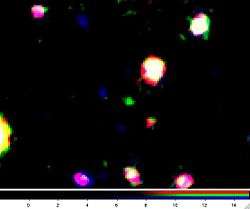LAE J095950.99+021219.1
| LAE J095950.99+021219.1 | |
|---|---|
 | |
| Observation data (J2000 epoch) | |
| Constellation | Sextans |
| Right ascension | 09h 59m 50.99s |
| Declination | +02° 12′ 49.1″ |
| Redshift | 6.944 |
| Distance |
13 billion light-years (light travel distance) |
| Apparent magnitude (V) | 24.1 |
| Other designations | |
| [HMR2011] LAE 2 | |
LAE J095950.99+021219.1 is one of the most distant galaxies discovered as of yet, and has high scientific use, as it has revealed many important details of the early universe and emerging stars. LAE J095950.99+021219.1 is about 13 billion light years away and is in the top ten for distant objects in the universe. It is a Lyman-alpha emitter.[1]
Discovery
LAE J095950.99+021219.1 was discovered in mid-2012. It was observed using the Magellan Telescopes at the Las Campanas Observatory in Chile.
Light
LAE J095950.99+021219.1 is emitting light identified at 6.944. It is 2-3 times fainter than other Lyman Alpha Galaxies
See also
References
- ↑ Rhoads, James E.; Hibon, Pascale; Malhotra, Sangeeta; Cooper, Michael; Weiner, Benjamin (20 June 2012). "A Lyman Alpha Galaxy at Redshift z=6.944 in the COSMOS Field". The Astrophysical Journal. 752 (2): L28. arXiv:1205.3161
 . Bibcode:2012ApJ...752L..28R. doi:10.1088/2041-8205/752/2/L28.
. Bibcode:2012ApJ...752L..28R. doi:10.1088/2041-8205/752/2/L28.
External links
- Astronomers discover faintest distant galaxy - Science Daily
- A Lyα GALAXY AT REDSHIFT z = 6.944 IN THE COSMOS FIELD
This article is issued from Wikipedia - version of the 7/12/2016. The text is available under the Creative Commons Attribution/Share Alike but additional terms may apply for the media files.